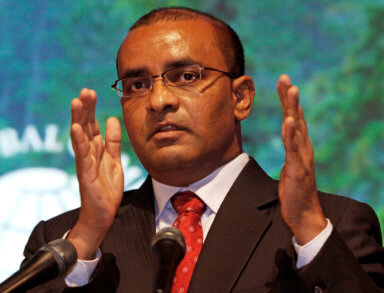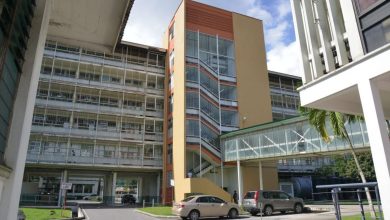News
Caribbean RoundUp

BARBADOS
Barbados Minister of Home Affairs, Wilfred Abrahams says his ministry is looking into the electronic monitoring of prisoners from the Dodd’s Prison.
In delivering the feature address during the recent passing out parade of 21 new prison officers, he noted that electronic monitoring was used in 30 countries worldwide and it was a generic plan that encompasses several monitoring techniques and approaches.
He said it is a form of digital integration often in the form of a wrist bracelet or ankle shackle that can monitor the location of an offender. It is sometimes used to reduce the use of imprisonment, monitor compliance, reduce re-offending, thus reducing the prison population.
He added that electronic monitoring in some cases allow offenders to remain at home as if under a curfew and ensured that they did not go into certain areas prohibited as a condition of their release.
First time offenders of minor crimes, those convicted of non-violent crimes whose imprisonment would exacerbate their economic and social livelihoods, would be among those most likely to benefit from an electronic managed system.
GUYANA
Guyana’s Vice President, Dr. Bharrat Jagdeo has said the budget for this year will be financed partly by Guyana oil revenues.
This will be Guyana’s first withdrawal from the Natural Resource Fund (NRF) since Guyana started collecting oil revenues in early 2020.
In an interview with National Communications Network (NCN), Jagdeo said oil revenues will reduce the reliance by Guyana on borrowing.
He noted that the fiscal deficit this year, in this budget, would be lower than the fiscal deficit in last year’s budget.
Jagdeo said the country is now spending more on big capital projects and as they come on stream, the fiscal deficit may widen.
However, because oil revenues will help to address the deficit, financing needs will be reduced.
Jagdeo said a significant part of the borrowing started with the previous government — Guy$90 billion a year — was coming from the domestic market.
As this will not happen to such a degree, Jagdeo said more funds will be left in the domestic market for private sector lending.
This, the vice president said, was part of the government’s strategy to deliver an element of sustainability in finances.
GRENADA
The Grenada government says it will table in Parliament a paper regarding the use of marijuana for medicinal purposes and will do so ahead of the next general election constitutional due in 2023.
Prime Minister Dr. Keith Mitchell told a news conference that the minister of agriculture with the support from the Cabinet had in fact been working with stakeholders “as far as this important issue is concerned.”
Mitchell said there is a “paper” that has already gone to Cabinet on the marijuana issue following discussions at the regional level “and our positions have been informed by some of the discussions.
“That paper will be laid before Parliament for public discussion before it becomes law and therefore that is not a wait for the next election. We are not waiting,” he said.
Mitchell said “we support the limited use of marijuana for medicinal purposes and other basic purposes.”
HAITI
The Canadian government has pledged US$39 million to the government of Haiti to assist the French-speaking Caribbean Community (CARICOM) nation with security and other projects.
This was the result of a virtual three-hour meeting led by Canadian Prime Minister Justin Trudeau recently.
Also present were foreign ministers from more than a dozen countries- including the United States, France and Mexico – and United Nations representatives.
“The increase in violence is only worsening the already precarious humanitarian situation, said Trudeau, ahead of the close-door meeting.
“We must work together to restore stability and to protect the safety and well-being of the Haitian population,” he said.
Canada pledged US$39 million, while other countries promised to improve Haiti’s security to support efforts to hold successful elections.
The nation is also committed to boosting Haiti’s National Police as it responds to spikes in violence, brazen gangs committing kidnappings and at least 20,000 residents left homeless due to turf wars.
The foreign ministers expressed deep concern about Haiti’s instability since the July assassination of President Jovenel Moise.
JAMAICA
Minister of Health, Dr. Christopher Tufton said has hinted at the possibility of Jamaica not achieving the target of having 65 percent of the population vaccinated against the COVID-19 virus by the end of March.
He told reporters that the vaccination uptake remains low and that the focus has now shifted from the vaccination target which was set early last year.
“Right now, we have admistered about 1.2 million doses……just under 600,000 have got a full compliment, whether the single dose or the double dose. So we are way below the target. We are 22 percent fully vaccinated. We really need to move with a pace to get more people vaccinated,” he said.
The health minister also defended Prime Minister, Andrew Holness from criticism leveled against him regarding the handling of the current COVID-19 wave.
Holness said he is not prepared to implement further measures to slow infections, stressing it is now up to Jamaicans to take personal responsibility to protect themselves and take the available vaccines.
ST. LUCIA
St. Lucia has signed a five-year agreement with Taiwan aimed at improving the island’s agriculture sector.
In a news release, the government of St. Lucia said that the “Enhancing the Efficiency of Production-Distribution Supply Chain in Fruit and Vegetable Sector in St Lucia” paves the way for more efficient and diversified agriculture sector.
Agriculture, Fisheries, Food Security and Rural Development, Alfred Prospere and Taiwan’s ambassador to St. Lucia, Peter Chen signed the agreement, which runs until Dec. 31, 2026 and follows a three-year accord which ended in November last year, for which the main objective was to reduce the island’s food import bill by 30 percent during that period.
The statement said under the program, Taiwan will leverage agricultural technology to strengthen the island’s agricultural production, improve farmer’s income and build up the resilience of the agricultural sector to mitigate the effects of climate change.
TRINIDAD
Transparency International’s Global Perception Index (CPI) has said that Trinidad and Tobago improved slightly from a score of 40 out of 100 in 2020 to 41 in 2021 with regard to corruption.
The CPI ranked 180 countries and territories around the world by their perceived levels of public sector corruption.
T&T’s rank also moved up one place from 2020 to 82 out of 180 countries.
Caribbean countries, which rank higher than T&T in this year’s CPI were Barbados (65), the Bahamas (64), St. Vincent and the Grenadines (59), Dominica (55), Grenada (53) and Jamaica (44).
Speaking at a virtual news conference last week Transparency Institute of Trinidad and Tobago’s (TITT) to announce this country’s position, chairman Dion Abdool said while the improvement was noted, a lot more must be done to improve T&T’s ranking, especially in operationalising existing legislation and introducing additional legislation to reduce corruption.
— Compiled by Azad Ali



